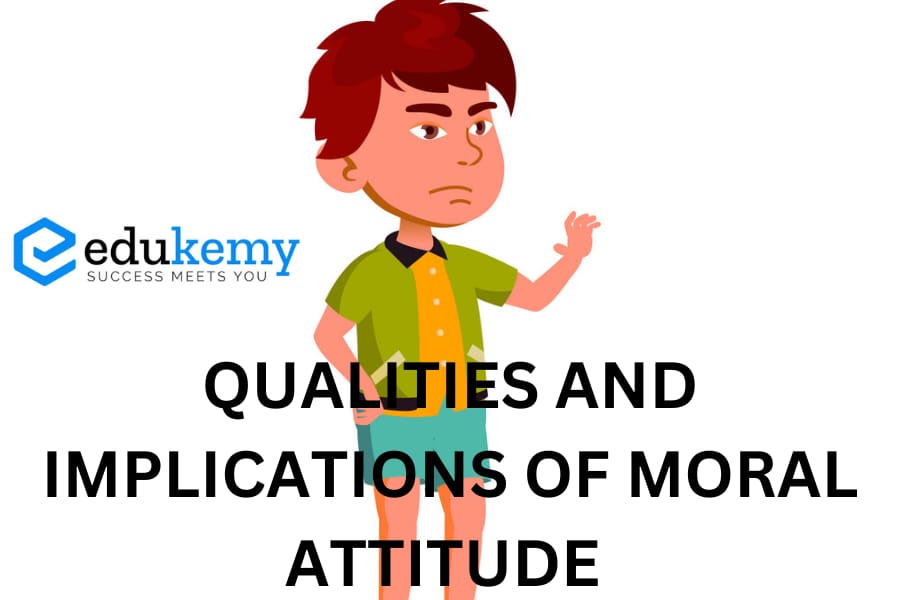
The concept of moral attitude refers to an individual’s disposition, beliefs, and values regarding what is right or wrong, good or bad, and the principles that guide their ethical decision-making. These attitudes are formed through a combination of personal experiences, cultural influences, upbringing, and philosophical considerations. Understanding moral attitudes is essential as they shape how individuals perceive and interact with the world around them, influencing their behaviors, choices, and relationships. Here are some qualities and implications of moral attitude:
Contents
Subjectivity:
Moral attitudes are inherently subjective, varying from person to person based on their unique backgrounds, beliefs, and experiences. What one individual considers morally acceptable, another may find objectionable. This subjectivity can lead to diverse perspectives on ethical issues within societies and across cultures.
Stability and Change:
While moral attitudes are often deeply ingrained, they are not static. They can evolve over time due to personal growth, exposure to new ideas, or shifts in societal norms. However, deeply held moral convictions may resist change, leading to conflicts between traditional and progressive values.
Influence on Behavior:
Moral attitudes significantly influence behavior, guiding individuals in making decisions that align with their ethical principles. People are more likely to act in ways consistent with their moral beliefs, even when faced with social pressure or personal gain.
Conflict and Consensus:
Differences in moral attitudes can lead to conflicts within communities and societies, particularly when individuals or groups hold divergent views on contentious issues such as abortion, capital punishment, or environmental conservation. Conversely, shared moral attitudes can foster social cohesion and cooperation, forming the basis for shared values and norms.
Moral Development:
Moral attitudes undergo development throughout the lifespan, influenced by factors such as cognitive development, education, and exposure to moral exemplars. Theories like Lawrence Kohlberg’s stages of moral development suggest that individuals progress through distinct stages of moral reasoning, from a focus on self-interest to a consideration of universal ethical principles.
Ethical Leadership:
In leadership roles, individuals’ moral attitudes play a crucial role in guiding their decision-making and behavior. Ethical leaders demonstrate integrity, fairness, and a commitment to values such as honesty, empathy, and social responsibility. Their moral attitudes set the tone for organizational culture and can inspire trust and respect among followers.
Social Justice and Equity:
Moral attitudes inform perspectives on social justice issues such as inequality, discrimination, and human rights. Individuals with a strong sense of moral duty may advocate for policies and practices that promote fairness, inclusivity, and equal opportunity, while those with differing attitudes may perpetuate systems of privilege and oppression.
FAQs
Q: What factors influence the development of moral attitudes?
Moral attitudes are influenced by a combination of factors including upbringing, cultural norms, religious beliefs, education, personal experiences, and exposure to diverse perspectives. Additionally, cognitive development plays a significant role, with individuals progressing through stages of moral reasoning as proposed by theorists like Lawrence Kohlberg.
Q: Can moral attitudes change over time?
Yes, moral attitudes can evolve over time due to personal growth, exposure to new ideas, shifts in societal norms, or transformative life experiences. While deeply held moral convictions may resist change, individuals are capable of reconsidering and revising their ethical beliefs in light of new information or insights.
Q: Do people with different moral attitudes always clash?
While differences in moral attitudes can lead to conflicts, they don’t always result in clashes. Respectful dialogue, empathy, and a willingness to understand differing perspectives can often bridge gaps between individuals with diverse ethical beliefs. Additionally, shared values and common goals can foster cooperation and consensus despite moral differences.
Q: How do moral attitudes influence decision-making?
Moral attitudes play a significant role in guiding decision-making by shaping individuals’ perceptions of right and wrong, influencing their priorities, and informing their choices. People tend to act in ways that align with their moral beliefs, even in situations where personal interests or external pressures may be at play.
Q: Can moral attitudes be taught or cultivated?
Yes, moral attitudes can be taught and cultivated through education, moral reasoning exercises, exposure to ethical role models, and discussions about values and principles. By promoting critical thinking, empathy, and a sense of responsibility towards others, individuals can develop a stronger ethical framework and a more conscientious approach to decision-making.
In case you still have your doubts, contact us on 9811333901.
For UPSC Prelims Resources, Click here
For Daily Updates and Study Material:
Join our Telegram Channel – Edukemy for IAS
- 1. Learn through Videos – here
- 2. Be Exam Ready by Practicing Daily MCQs – here
- 3. Daily Newsletter – Get all your Current Affairs Covered – here
- 4. Mains Answer Writing Practice – here

